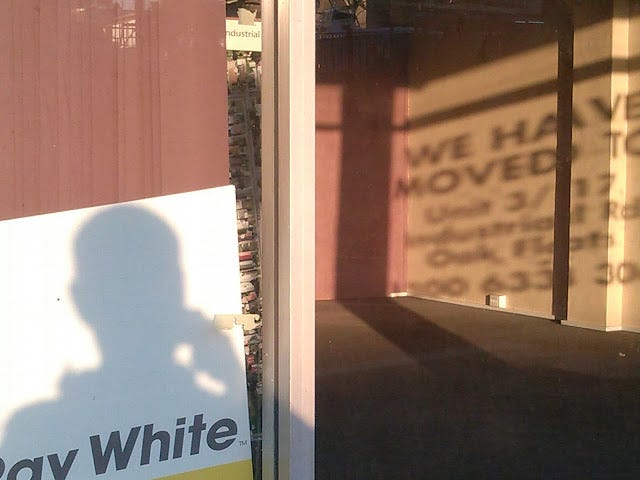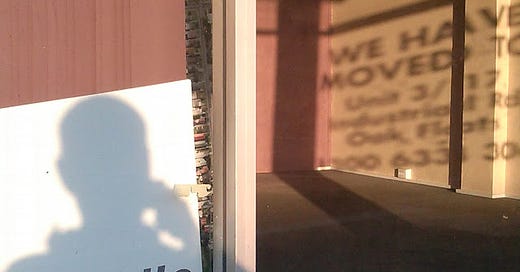
Death of the Local Shopping Centre, Australia
Far below, so far below it was barely possible to make out the patchwork quilt of farms, the tiny village. The fall was steep, very steep. A swan dive into an ordinary life, a dive into a place from which he had been previously immune. There wasn't any way to surrender now. "It may be possible to reintegrate him back into normal life." The stray threads, the mistakes he had made, the terrible squandering and distress, a malfunctioning unit. What evil was he supposed to have done? He had blundered into a cesspit, and that was that. Eaten alive. The pit in his stomach would not go away.
Away, away from where you were. Into hiding. Nobody could see behind the screens. That had been the modus operandi for much of his life, until, all at once, the screens had collapsed, exposing a shrieking, under-developed animal trying to hide from the light. Now the screens, in response to circumstance, were building again. Trying to find a way to protect himself from the "slings and arrows" of misfortune, for all was lost. "He will regret it for the rest of his life." He already knew that. The time had come to say goodbye. If he couldn't find a way out in the real world, he would find it in another.
Reintegrate into normal life? We shall see about that. He didn't want to be cornered. He didn't want to be responsible. He just wanted to take a long quiet look at things that had never happened, to be someone other than the stigmata, to find a place where no one knew him, where he could find peace. All in all, the darkness wept. If there was no immediate path opening up, there were the dizzying heights and the valley far below, a unique perspective. There was a way of thinking no one could endure. There was a time and a place for everything, but he could not find it. He launched off the side of the cliff, already flying.
But unlike the populated dreams of childhood, it was difficult to control his fall. Sometimes he tumbled, sometimes he soared. He could see, kilometres below, the little house which offered refuge, a secret life, another path. But it was difficult to hold his balance, difficult to break his fall. The hot gusts of air from below swirled him up, almost back to the edge of the cliff from which he had leapt. And then he ducked and dived, far out, far below. Yes, their faces still came to haunt him. Yes, mistakes from a former life continued to batter through the fabric of things. But now, air-borne, he had to manage his descent, down down, into a farmer's life, a farmer's wife, into a place where children ran in sunlit fields and corn rustled in the barely moving air. It was a long and dangerous fall. And it wasn't over yet.
THE BIGGER STORY:
http://www.firstperspective.ca/index.php/news/2274-john-pilger-s-damning-new-film-about-indigenous-australia
Julian Drape
The Sydney Morniing Herald
"It's so degrading," says Noongar elder Noel Nannup in John Pilger's latest film about indigenous disadvantage in Australia.
The Aboriginal man is standing in a $240-a-night hotel room on Rottnest Island which used to be divided into three prison cells in which more than 50 indigenous people died.
"They don't have any idea what happened in here," Nannup tells Pilger of the hotel's paying guests.
"No one tells them. No one lets them know."
It's perhaps the most poignant moment in Utopia.
London-based Pilger returns to outback Australia for this documentary film to find little has changed since his 1985 work The Secret Country.
The Utopia of the title refers to the Northern Territory region north of Alice Springs.
There are the same shacks, the same lack of basic services and the same diseases.
"I was shocked all over again," Pilger tells AAP.
"It's not that I expected a great deal of change. But to fly from a rich metropolis like Sydney, in what is now one of the richest countries on the planet, and drive into impoverished communities deprived of the basic services that the majority of Australians take for granted, is shocking."
Pilger, 74, sees a treaty and genuine land rights as the key to improving the position of the original owners of Australia.
Anything less, including the current talk of constitutional recognition, is simply a "distraction", he says.
The film opened in the United Kingdom in mid-November and screens in Sydney on January 17. Subsequent limited dates include Melbourne, Brisbane, Perth and Alice Springs.
Pilger would have been delighted to show Utopia in Australia first but no local distributor offered a cinema run.
"One Australian distributor refused to take the film because he said it was 'too dark' and 'it might upset people with its myth-busting'," the veteran journalist says.
The film was commissioned by ITV in Britain and funded entirely in the UK.
Pilger doesn't pull any punches in Utopia.
He asks Warren Snowden, then indigenous health minister and a Labor MP in the Northern Territory for 23 years, "Why haven't you fixed it?"
Snowden, who has already admitted government policy has failed for at least 50 years, hits back stating: "What a stupid question. What a puerile question."
But Pilger doesn't apologise for taking such an uncompromising view.



